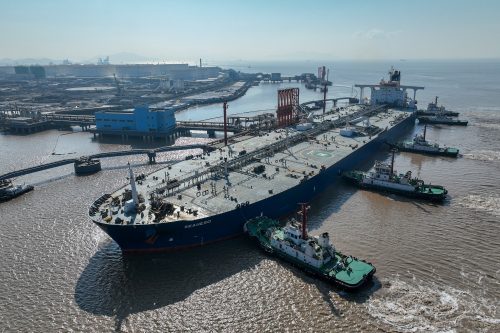Crude oil prices rose, during trading today, Friday, March 17 (2023), for the second session in a row, in an attempt to regain some gains after the losses they suffered at the beginning of the week.
The rise was supported by Saudi Arabia and Russia’s assurances of their commitment to the OPEC + decision to reduce oil production by two million barrels per day until the end of 2023, after talks between Saudi Energy Minister Prince Abdulaziz bin Salman and Russian Deputy Prime Minister Alexander Novak.
Market fears also subsided amid strong expectations of demand in China, after a banking crisis led to heavy selling in global financial and oil markets this week.
Crude oil prices today
By 07:36 a.m. GMT (10:36 a.m. Mecca time), the prices of benchmark Brent crude futures – for May 2023 delivery – rose by 0.59%, to reach $75.14 a barrel.
The price of US West Texas crude futures – delivery in April 2023 – increased by 0.61%, to $68.77 a barrel, according to data seen by the specialized energy platform.
Crude oil prices ended their dealings, yesterday, Thursday, March 16, with an increase of more than 1%, after 3 sessions of losses, as a result of which they fell to their lowest levels in 15 months.
Analysis of the price of a barrel of oil
Both benchmarks hit their lowest in more than a year this week, and are set to post their biggest weekly decline since December, at around 10%.

Crude oil prices and other global assets fell this week; The collapse of Silicon Valley Bank and Signature Bank prompted them to seek to support liquidity in banks.
“Oil demand is re-pricing, but we see little change in fundamentals and tend to outpace volatility in the financial sector, keeping our crude oil price outlook unchanged for the time being as we await updates on potential policy actions in the coming weeks,” JP Morgan analysts said. “.
The comment came in reference to the OPEC+ meeting and expectations of Washington moving to start refilling the strategic oil reserves, in the coming weeks, Reuters reported.
OPEC+ meeting
The Advisory Committee of the Organization of the Petroleum Exporting Countries (OPEC) and its allies, including Russia, in the alliance known as OPEC+, will meet on April 3.
Analysts at the National Bank of Australia said that a further decline in crude oil prices may prompt OPEC + to cut supplies to prevent the expected increase in stocks in the second quarter.
Sources in OPEC + had confirmed, in exclusive statements to the specialized energy platform, that the decline in crude oil prices is a “natural reaction” to what is happening in the market, indicating that the alliance does not intend to make any change in production policy during the current period.
WTI fell below $70 a barrel for the first time since December 2021, which could make prices attractive enough for the US government to start refilling the Strategic Oil Reserve, which is at record low levels; What drives demand?
demand for oil
Analysts’ expectations of a recovery in demand in China supported the recovery in prices at the end of the week; US crude exports to China in March reached their highest levels in about two and a half years.
Analyst at CMC Markets, Tina Teng, said that the recovery of demand in China will be positive for crude oil prices if the upcoming data shows a good recovery for the country’s economy.
ANZ analysts said, in a note to clients: “Road traffic and air travel in China are growing strongly while there are signs of improvement in advanced economies,” Reuters reported.
However, the risks of contagion among the banks still keep investors on edge. which curbs their appetite for assets such as commodities; They fear that further flight could lead to a global recession and lower demand for oil.
“The recent banking turmoil may continue to affect the demand outlook, and these issues related to inflation, central banks raising interest rates, and confidence in financial systems, cannot be settled quickly,” Teng said.
related topics..
Also read..

Leave a Reply